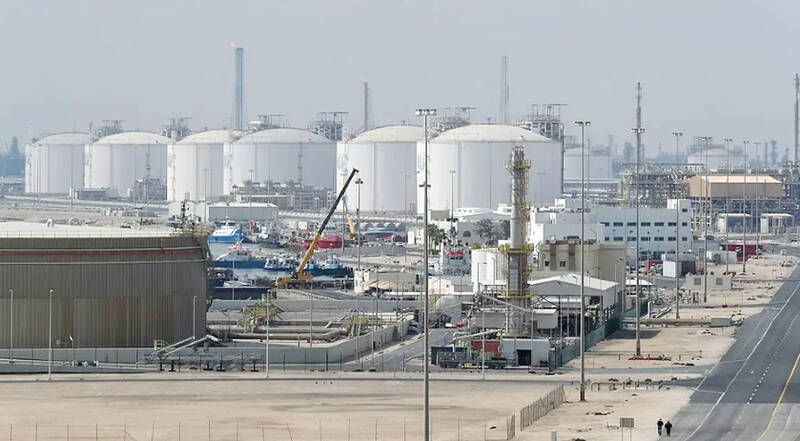Qatar has agreed to supply CPC Corp, Taiwan (CPC, 台灣中油) with natural gas for 27 years, the emirate’s state energy company announced yesterday.
Qatar will supply four million tonnes of gas a year under the deal, QatarEnergy said in a statement, without disclosing the cost of the agreement.
“We look forward to further enhancing our relationship with CPC... and to further demonstrate our unwavering commitment to our customers and partners around the world,” said Energy Minister Saad al-Kaabi, who is also the chief executive of QatarEnergy.

Photo: Reuters
Qatar is one of the world’s top liquefied natural gas (LNG) producers alongside the US, Australia and Russia.
Asian countries led by China, Japan and South Korea have been the main market for Qatari gas, but demand has also grown from European countries since Russia’s war on Ukraine threw supplies into doubt.
Under the deal, inked at a signing ceremony in Doha, CPC is to be given a partnership in Qatar’s North Field East project, a part of Qatar’s overall North Field Expansion program.
The larger expansion, which broke ground last year, contains the world’s biggest natural gas reserves and extends under the Gulf into Iranian territory.
CPC chairman Lee Shun-chin (李順欽) said QatarEnergy had been “playing an important role in ensuring Taiwan’s domestic gas market over the past decades.”
He said acquired equity in the North Field East project “will further strengthen the cooperative relationship between our two countries”.
In February, Qatar announced plans to expand its output from its North Field project, saying it will boost capacity to 142 million tonnes per year before 2030.
In recent months, Qatar has inked LNG deals with France’s TotalEnergies SE, Britain’s Shell PLC, India’s Petronet Ltd, China’s Sinopec Corp (中國石化) and Italy’s Eni SpA among others.
The first with Sinopec in 2022, also for 27 years, was at the time the longest in the LNG industry.

Taiwan’s rapidly aging population is fueling a sharp increase in homes occupied solely by elderly people, a trend that is reshaping the nation’s housing market and social fabric, real-estate brokers said yesterday. About 850,000 residences were occupied by elderly people in the first quarter, including 655,000 that housed only one resident, the Ministry of the Interior said. The figures have nearly doubled from a decade earlier, Great Home Realty Co (大家房屋) said, as people aged 65 and older now make up 20.8 percent of the population. “The so-called silver tsunami represents more than just a demographic shift — it could fundamentally redefine the

The US government on Wednesday sanctioned more than two dozen companies in China, Turkey and the United Arab Emirates, including offshoots of a US chip firm, accusing the businesses of providing illicit support to Iran’s military or proxies. The US Department of Commerce included two subsidiaries of US-based chip distributor Arrow Electronics Inc (艾睿電子) on its so-called entity list published on the federal register for facilitating purchases by Iran’s proxies of US tech. Arrow spokesman John Hourigan said that the subsidiaries have been operating in full compliance with US export control regulations and his company is discussing with the US Bureau of

Businesses across the global semiconductor supply chain are bracing themselves for disruptions from an escalating trade war, after China imposed curbs on rare earth mineral exports and the US responded with additional tariffs and restrictions on software sales to the Asian nation. China’s restrictions, the most targeted move yet to limit supplies of rare earth materials, represent the first major attempt by Beijing to exercise long-arm jurisdiction over foreign companies to target the semiconductor industry, threatening to stall the chips powering the artificial intelligence (AI) boom. They prompted US President Donald Trump on Friday to announce that he would impose an additional

China Airlines Ltd (CAL, 中華航空) said it expects peak season effects in the fourth quarter to continue to boost demand for passenger flights and cargo services, after reporting its second-highest-ever September sales on Monday. The carrier said it posted NT$15.88 billion (US$517 million) in consolidated sales last month, trailing only September last year’s NT$16.01 billion. Last month, CAL generated NT$8.77 billion from its passenger flights and NT$5.37 billion from cargo services, it said. In the first nine months of this year, the carrier posted NT$154.93 billion in cumulative sales, up 2.62 percent from a year earlier, marking the second-highest level for the January-September